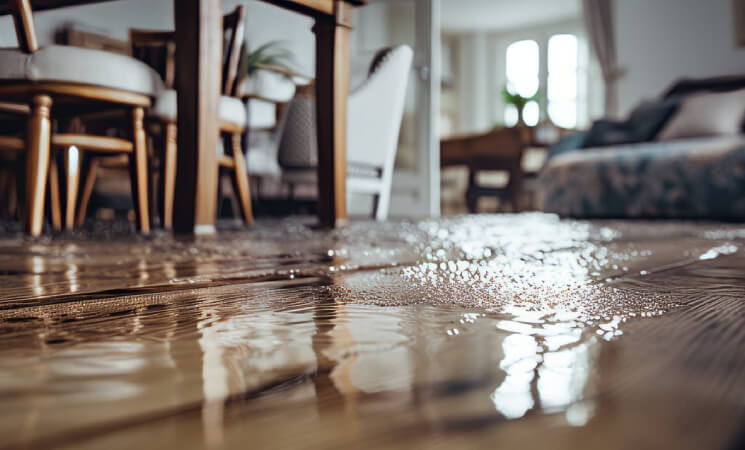In the aftermath of a flood, the visible damage is often just the beginning of the problem. Flood damage, if not properly addressed, can pose significant health risks long after the waters have receded. Understanding these risks and knowing how to mitigate them is crucial for protecting your health and restoring your living environment. This guide will explore the health hazards associated with flood damage and provide essential steps for cleanup and mitigation.
Understanding Flood Damage
Flood damage is more complex than just water-soaked belongings. It can involve:
- Contaminated water (potentially containing sewage or chemicals)
- Structural damage to buildings
- Mold growth
- Electrical hazards
These components make flood damage particularly challenging and potentially dangerous to address.
Health Risks Associated with Flood Damage
- Waterborne Diseases
- Gastrointestinal illnesses from contaminated water
- Skin infections from contact with flood water
- Tetanus risk from cuts exposed to contaminated water
- Respiratory Issues
- Mold growth can cause allergic reactions and respiratory problems
- Dust and debris from cleanup can irritate lungs
- Physical Injuries
- Risk of electrocution from water-damaged electrical systems
- Injuries from slips and falls on wet surfaces
- Cuts and bruises from flood debris
- Psychological Impact
- Stress and anxiety from property loss and disruption
- Potential for post-traumatic stress disorder (PTSD)
Immediate Mitigation Steps
If you’re dealing with flood damage, take these immediate steps:
- Ensure the area is safe to enter (check for structural and electrical hazards)
- Wear appropriate protective gear (waterproof boots, gloves, eye protection)
- Remove standing water as quickly as possible
- Begin documenting damage for insurance purposes
Professional Mitigation and Restoration
While minor flood damage can sometimes be addressed DIY, significant damage requires professional intervention. Search for “water damage restoration near me” to find qualified professionals who can:
- Assess the extent of flood damage
- Develop a comprehensive restoration plan
- Use specialized equipment for water extraction and drying
- Address hidden damage in walls, floors, and HVAC systems
The Importance of Prompt Action
Quick action is crucial in mitigating flood damage health risks:
- Prevents mold growth, which can start within 24-48 hours
- Reduces the risk of structural damage
- Minimizes the potential for waterborne diseases
Cleaning and Decontamination Processes
Water Removal
- Use pumps and wet vacuums to remove standing water
- Employ professional-grade dehumidifiers and air movers for drying
Surface Cleaning
- Clean and disinfect all surfaces that came into contact with flood water
- Use EPA-registered disinfectants appropriate for different materials
Mold Prevention
- Thoroughly dry all affected areas
- Apply mold-inhibiting products where necessary
- Monitor humidity levels to prevent future mold growth
Proper Disposal
- Safely dispose of items that cannot be cleaned or disinfected
- Follow local guidelines for disposing of contaminated materials
Addressing Structural Damage
Flood damage often affects the structure of buildings. Consider “fire damage repairs near me” services, as these professionals often handle various types of restoration, including:
- Repairing or replacing damaged drywall
- Addressing warped flooring
- Checking and repairing foundation issues
Long-term Health Protection Strategies
After initial cleanup, consider these long-term strategies:
- Regular air quality testing
- Installing dehumidifiers in flood-prone areas
- Implementing a regular inspection schedule for potential mold growth
- Upgrading to water-resistant materials in vulnerable areas
Psychological Recovery
Don’t underestimate the emotional impact of flood damage:
- Seek counseling if you’re experiencing anxiety or PTSD symptoms
- Connect with community support groups for flood survivors
- Engage in stress-reduction activities
Insurance Considerations
Understanding your insurance coverage is crucial:
- Review your policy for flood damage coverage
- Document all damage thoroughly with photos and videos
- Keep receipts for all cleanup and restoration expenses
- Consider hiring a public adjuster for complex claims
Prevention and Future Preparedness
While addressing current flood damage, think ahead:
- Install backflow valves on sewer lines
- Elevate important utilities above potential flood levels
- Create a flood emergency plan
- Consider flood-resistant renovations in high-risk areas
When to Seek Medical Attention
Be aware of symptoms that warrant medical attention:
- Gastrointestinal issues after contact with flood water
- Wounds that show signs of infection
- Persistent respiratory problems
- Unexplained rashes or skin irritations
Special Considerations for Vulnerable Groups
Some individuals are at higher risk for flood-related health effects:
- Children
- Elderly
- Pregnant women
- Those with compromised immune systems
These groups should take extra precautions and consult healthcare providers if exposed to flood waters.
The Role of Water Mitigation Company
A water mitigation company can play a crucial role in flood damage cleanup. These specialists can:
- Quickly remove standing water and begin the drying process
- Assess and mitigate potential structural damage
- Implement mold prevention strategies
- Coordinate with other restoration professionals for comprehensive recovery
Conclusion: Prioritizing Health in Flood Recovery
Dealing with flood damage is a complex process that requires careful attention to health and safety. By understanding the risks and taking prompt, thorough mitigation steps, you can protect yourself and your loved ones from both immediate and long-term health hazards.
Remember, the impacts of flood damage can linger long after the waters recede. Don’t hesitate to seek professional help, both for restoration and health concerns. With proper cleanup, mitigation, and ongoing vigilance, you can restore not just your living space, but also your peace of mind and well-being.
Your health and safety are paramount. By taking these flood damage cleanup steps seriously and engaging professionals when needed, whether it’s searching for “water damage restoration near me,” “fire damage repairs near me” (for structural issues), or contacting a water mitigation company, you’re investing in a healthier, safer future for yourself and your family.






